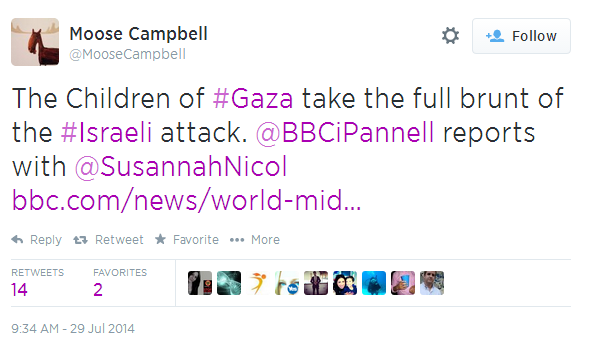A few months ago we published an essay arguing that, in the event talks between the two parties break down and another is Intifada is initiated by Palestinian leaders, we can expect the Guardian to morally justify the violence.
What we didn’t address at the time was our similar confidence that their editors, reporters and commentators would blame Israel for the break down in talks.
Sure enough, as talks have all but broken down (due to unilateral Palestinians acts hours before the Israeli government was set to approve an American brokered deal to extend talks to 2015), the Guardian published an official editorial which parrots the discredited claim that an Israeli announcement for new home tenders in east Jerusalem was the culprit.
Here are the relevant passages in the Guardian editorial (The Peace Bubble Bursts, April 11):
[Kerry’s] determined concentration on peace talks between the Israelis and the Palestinians, his repeated trips to the Middle East, and many months of hard work by a small army of advisers, drafters and facilitators, have ended not in a bang but a whimper
The “poof” moment was Israel‘s announcement of permits to build 700 new homes for settlers in East Jerusalem, a clearly provocative move given the Palestinian demand for a halt, or at least a pause, in settlement activity, and their insistence that East Jerusalem should be the capital of a Palestinian state
Of course, the claim that an “announcement of permits to build [708] new homes for settlers in East Jerusalem” effectively ended the talks is not even remotely accurate.
First, Israel never agreed to so much as curtail the construction of homes beyond the green line (in Jerusalem or the West Bank) in the initial agreement brokered by Kerry to begin talks last July. They agreed to release Palestinian prisoners, but made no such guarantees regarding ‘settlements’.
Second, the east Jerusalem homes were reportedly a reissue of an earlier pronouncement permitting these new apartments in Gilo to be built, which, as Adam Kredo noted, means “that the substance of the decree [on new homes in east Jerusalem] had not changed for months and had not [previously] been a roadblock to the peace talks”.
Third, other such ‘settlement’ construction announcements during negotiations have been made by Israeli authorities without major incident – due, again, to the fact that Israel never agreed to curtail such activity – prior to the east Jerusalem tenders. This includes a January announcement that tenders were released for the construction of 600 homes in the Ramat Shlomo neighborhood in east Jerusalem.
Finally, it’s important to note that the 708 housing tenders were issued for Gilo, a neighborhood in Jerusalem which almost everyone (including the Palestinians) agrees will remain under Israeli control upon a final status agreement. In fact, the Guardian should look back at their own reports of the leaked Palestinian notes during negotiations between Abbas and Olmert in 2008 (known as the Palestine Papers), where they confirmed that Palestinians leaders agreed that Gilo would remain Israeli.
Here’s a passage from a Jan 23, 2011 Guardian report by Seumas Milne and Ian Black:
The concession in May 2008 by Palestinian leaders to allow Israel to annex the settlements in East Jerusalem – including Gilo, a focus of controversy after Israel gave the go-ahead for 1,400 new homes – has never been made public.
Here’s the map they published showing the Jerusalem neighborhoods in Jerusalem (in blue) which (Palestinians agreed) would be Israeli under the plan. As you can see, the neighborhoods (beyond the green line) which Israel would retain include the Jewish Quarter of the Old City, East Talpiot, and Gilo.
 In short, the Guardian’s risible suggestion that 708 housing tenders for Gilo caused the peace talks to fail does not represent the dispassionate analysis of ‘professional journalists’, but, rather, the deceit and sophistry of a crooked lawyer.
In short, the Guardian’s risible suggestion that 708 housing tenders for Gilo caused the peace talks to fail does not represent the dispassionate analysis of ‘professional journalists’, but, rather, the deceit and sophistry of a crooked lawyer.




